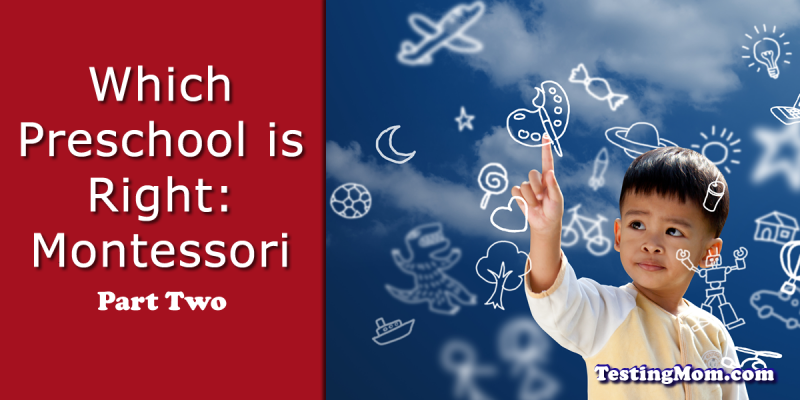› Which Preschool is Right: Montessori
Which Preschool is Right: Montessori
posted by Karen Quinn, The Testing Mom - January 28th, 2016
Yesterday I asked the question which preschool is right for your child. Let’s begin with Montessori schools.
Personally, I love Montessori schools and encourage you to tour one and see for yourself.
Not only do kids learn a lot, but they are taught not to start a new project until they put the materials they were working on away. My daughter was always very messy, and I have to wonder if she wouldn’t have been had I sent her to a Montessori school.
History of Montessori Schools
Maria Montessori started Montessori schools in early 20th Century as a way to train special needs children. The materials she created were so effective that they were later used with normally intelligent kids.
What Sets Montessori Schools Apart?
In a Montessori classroom, the main interaction is between the child and the materials, not the teacher and the materials. At first, the teacher demonstrates to the children the proper use of each set of materials. Then, the child can take the materials out, place them on a mat and use them as the teacher taught her. When she is finished, she puts it away before starting another project. The emphasis is on self-directed learning.
The Building Blocks of the Classroom
The materials used in a Montessori classroom are built around 5 areas. 1) Practical life skills (folding shirts, tying shoelaces), 2) Sensory (handling geometric shapes, putting blocks into the right holes), 3) language, 4) mathematical (handling sandpaper letters and numbers, counting beads on long chains) and 5) cultural (a broad exposure to many areas of science). As you can imagine, children learn a great deal with this curriculum – numbers, letters, adding, subtracting, practical life skills, information and more.
Montessori Classroom
Classes are of mixed ages, usually 3 – 6, with the older children helping the younger ones. Kids are encouraged to work at their own pace and build their own foundation of knowledge. When they emerge from Montessori, they are organized, respectful of other children’s work, and able to work independently.
As you can see, Montessori schools have much to offer your child! But there are more approaches. Join us tomorrow for progressive schools.
Preschool Series:




Tell us about your experiences
3 Responses
Meg
Because their was no Montessori preschool in the area when I was raising my three children, I used a progressive preschool for all three, but used a book entitled “Montessori in the Home” to make a set of Montessori materials for use in the home. These were special playthings that were only available to them at times when I could model how to use them and insure that they were either used appropriately or put away. This combination of approaches worked well. All three of the children did well in school, academically and behaviorally. Each one finished college and earned a graduate degree in the field of study they selected. Each has achieved career success and enjoys their work. I love the creativity, curiosity, and love-of-learning that the progressive approach reinforced so well. The Montessori approach taught them the importance of following directions and controlling impulses well enough to be able to channel and effectively use all that creativity in their daily lives and in their school and (later) occupational activities. Preschool children really need both approaches because each one contributes something different to a child’s development.
Melissa
What many people don’t know is that Montessori is available all the way through middle school. So if you are looking for a great preschool and an alternative to the mess public education has become, you will find it in Montessori. Montessori elementary programs continue the philosophy of “follow the child” so that children are allowed to learn at their own pace. Mixed age levels allow students to learn from each other. Nobody is ahead or behind. We educate the whole child, fostering their emotional and social development as well as intellectual. Montessori students become global learners, able to get along with others diplomatically and think critically. Concepts all the way through algebra and geometry are taught concretely, in a way that makes sense. All children have an in are love of learning. Public school ignores this and entices children to complete tasks that are developmentally inappropriate through the use of meaningless external rewards and punishment. Montessori nurtures and respects this love of learning
Just a note: the name Montessori is not trademarked. Any school can call themselves at Montessori school. Make sure the school you’re interested in is properly accredited or recognized by AMI, AMS, or another Montessori organization.
Alison
Fixes to the article: change word retarded- also it’s Maria Not Marie. The classroom is built around 5 areas-not three: Practical Life, Sensorial, Math, Language, and Cultural Area (culture includes science and geography). The culture part of the curriculum for a 3-6 year old is immensely extensive with the geography work.